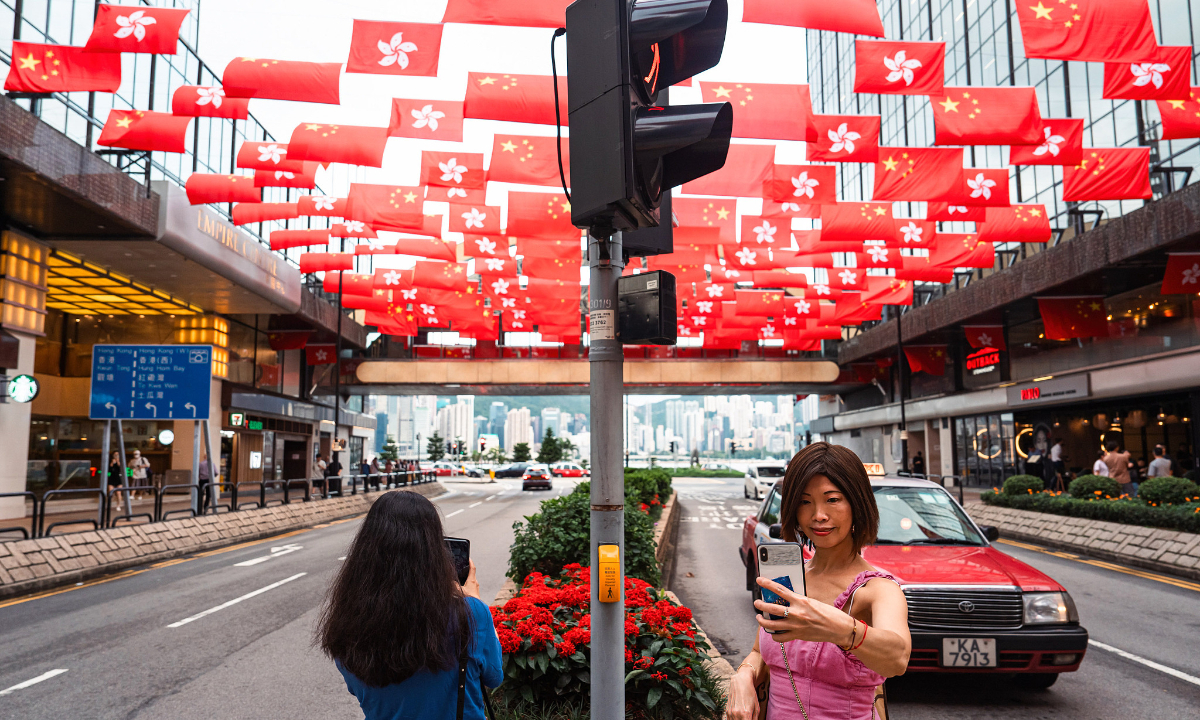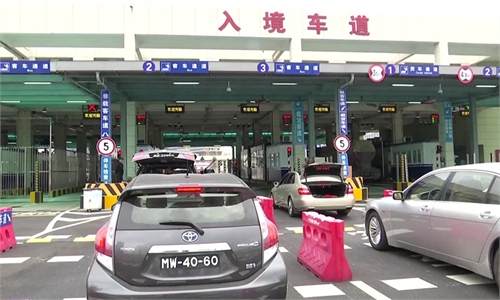
Local residents take photos of Chinese national flags and flags of Hong Kong Special Administrative Region on Friday, ahead of July 1 which marks the 26th anniversary of Hong Kong's return to the motherland. Photo:VCG
The Hong Kong regional government plans to establish a memorial museum themed with the city's history of resistance against Japanese aggression, which experts said on Monday will help deepen the understanding of citizens, especially young people, on the history and enhance patriotism.
Hong Kong Special Administrative Region (HKSAR) Chief Executive John Lee Ka-chiu proposed setting up an "Office for Promoting Chinese Culture" and an anti-Japanese aggression memorial hall in Hong Kong in his new Policy Address, hoping to make the public aware of how the Hong Kong people resisted and fought against Japanese invasion at that time, Hong Kong-based Sing Tao Daily reported on Saturday.
The Japanese army attacked Hong Kong on December 8, 1941. After 18 days of fighting, Hong Kong fell and entered a dark period that saw "three years and eight months" of Japanese occupation.
Hong Kong currently does not have a memorial museum led by the HKSAR government with the theme of Hong Kong's resistance war. Some Hong Kong resistance-related historical materials are distributed in the Hong Kong Museum of History and the Hong Kong Museum of Coastal Defence.
Such museum will help people, especially the young generation, learn about how Hong Kong compatriots fought side by side with mainland compatriots against Japan's aggression and the contributions of the anti-Japanese Dongjiang Column led by the Communist Party of China (CPC), Lau Siu-kai, a consultant from the Chinese Association of Hong Kong and Macao Studies, told the Global Times on Monday.
"This would help strengthen Hong Kong people's national consciousness, ethnic awareness and identification with the CPC, which will further benefit the city's integration into the overall development of the country," Lau said, adding that this will help reduce people's blind admiration of Japan.
Through knowing the suffering brought when Hong Kong was attacked and invaded, citizens can better understand who they are and the fact that the city's fundamental interests aligned with the whole country, said Legislative Council member Brave Chan Yung, who has been advocating the construction of the museum.
Chan suggested starting by remaking existing historical museums and freeing up at least half of the space for the exhibition on the history of the resistance, as building a new one would take too much time.
As Hong Kong's resistance against Japan's invasion is also related to the mainland, historical events such as the September 18 Incident can be incorporated to enrich the content of the memorial, Lau added.
The deliberation of China's patriotic education draft law is one of the items of the agenda of the 6th session of the Standing Committee of the 14th National People's Congress, China's top legislature, which will be held from October 20 to October 24.
According to the draft law, education on China's history, culture and national conditions will be conducted for residents from the regions of Hong Kong, Macao, and Taiwan to strengthen their recognition of the country and its traditional culture and to consciously maintain the country's unity.


